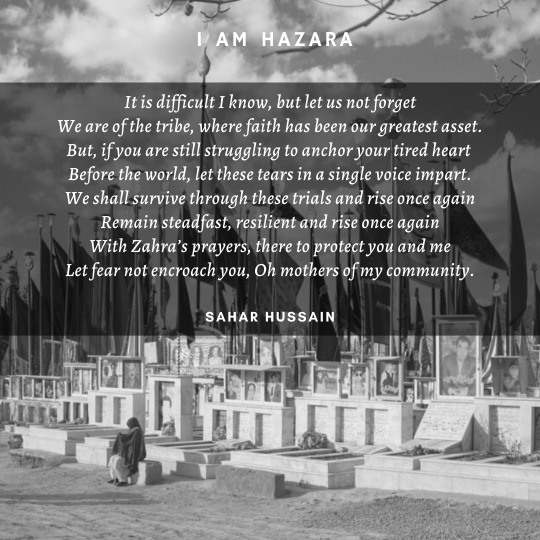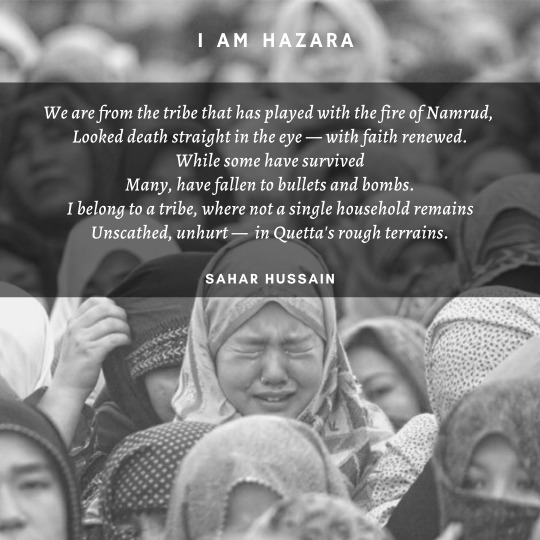For the silenced Hazaras of the past, present and future
Don't wanna be here? Send us removal request.
Text
“Do not refute everything that people say to you for that is enough to classify you as foolish.”
— Imam Ali (a.s.), Ghurar al-Hikam, no. 10251
35 notes
·
View notes
Photo


cute Hazara babies in traditional Hazaragi clothes
7 notes
·
View notes
Photo

AFGHANISTAN. Ethnic Hazara women visit a Shia shirne in Bande Amir, Bamiyan Province.Moises Saman
2K notes
·
View notes
Text


Hazaras of Afghanistan
Photos by Basir Moradi
552 notes
·
View notes
Text



Everyday life in Afghanistan
By photographer: Jafar Rahimi
225 notes
·
View notes
Photo

With Zahra’s prayers, there to protect you and me Let fear not encroach you, Oh mothers of my community.
7 notes
·
View notes
Text
Colliers in Balochistan hesitate to work after Hazara killing incident
Colliers in Balochistan hesitate to work after Hazara killing incident
Photo: File QUETTA: After the tragic killing of 10 coal miners in Balochistan, thousand of colliers in the province have started showing reluctance to work in the industry. According to officials and labour organisations, up to 15,000 workers had downed tools since the murder of the Hazara group, forcing around 200 mines to close and slashing production. More than 100 mines were “still…

View On WordPress
2 notes
·
View notes
Text
So like, I have this tendency to be a little bit airheaded and forgetful at times, right?
So sometimes I’ll make a silly mistake, and my mom will tell me, “Tu imroz yagzara goslayi, na?”
Which basically means, “Today you’re being a little silly, aren’t you?”
But while “gosla” can be an affectionate term for someone who is “silly, naive, ignorant, airheaded”, the actual meaning for it is “baby cow”.
So basically, she’s telling me, “Today you’re being a little bit baby cow, aren’t you?”
40 notes
·
View notes
Photo









The Hazaras are an ethnic group native to the mountainous region of Hazarajat in central Afghanistan. They speak the Hazaragi variant of Persian. The Hazara, outside of Hazarajat, have adopted the cultures of the cities where they dwell, resembling customs and traditions of the Afghan Tajiks and Pashtuns. Traditionally the Hazara are highland farmers and although sedentary, in the Hazarajat, they have retained many of their own customs and traditions. More like this
36 notes
·
View notes
Text
AfghanistanAdventures#30 ~ Mary Smith
Reblogged from MarySmith’sPlace :
I puffed my way into the compound where the clinic In-charge, Hassan and his wife, Zohra met me. Hassan whisked the menfolk off to the guest room and I joined Zohra and her three children for a welcoming breakfast in the family room. It was utter bliss to sit on a soft mattress with clean plump cushions to lean on.
Hassan popped his head in to tell me Sayed was…
View On WordPress
2 notes
·
View notes
Text
AfghanistanAdventures#57: Falling off a mountain – snow, ice & wolves ~ Mary Smith
AfghanistanAdventures#57: Falling off a mountain – snow, ice & wolves ~ Mary Smith
Reblogged from Mary Smith’s Place:
Afghanistan, December 1989

As we prepared to leave Arif’s clinic he became unusually quiet until, as he was saying goodbye, I realised how upset he was by his young brother, Sharif’s departure. He was coming with us to Pakistan where Arif had arranged for him to attend school in Karachi. I promised to take care of him, and with tears in his eyes he finally…
View On WordPress
2 notes
·
View notes
Text
Afghanistan Adventures ~ Mary Smith #60 final journey
Afghanistan Adventures ~ Mary Smith #60 final journey
Reblogged from MarySmith’sPlace:
Afghanistan, December 1989 Jaghoray to Quetta

Suddenly, it was time to leave. The last few days were hectic, full of frantic packing and emotional farewells.

Dinner party
So many people were joining us on the journey to Pakistan that we needed two vehicles. The night before departure the clinic was overflowing with people and, desperate to escape the noise and…
View On WordPress
2 notes
·
View notes
Text
Women wearing a chadari in Afghanistan is romanticised and portrayed very differently from its actual purpose wherein they are painted as these fierce, independent and courageous women.
They’re scared, forced to submit to the Pashtunwali code that is manifest in all aspects of the law in Afghanistan. They aren’t fierce, independent or courageous. They want freedom and to make independent choices with no pressure.
0 notes
Photo

This picture haunts me.
Three girls from the Hazara ethnic group sit in a cave in Bamiyan, Afghanistan on December 15, 2001. The Taliban forced tens of thousands of Shi'ite Muslims to flee into the mountains during their rule over the country in the 1990s and early 2000s.
2K notes
·
View notes


